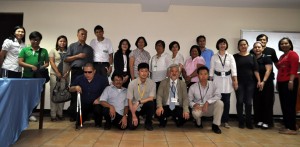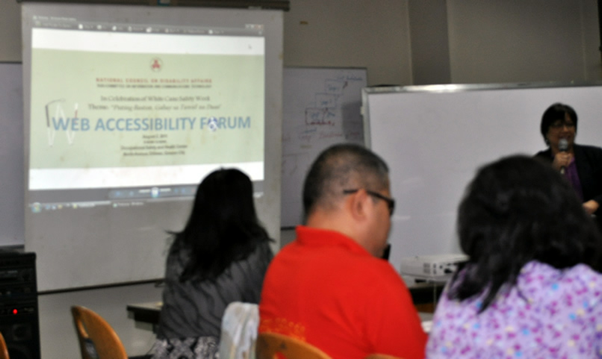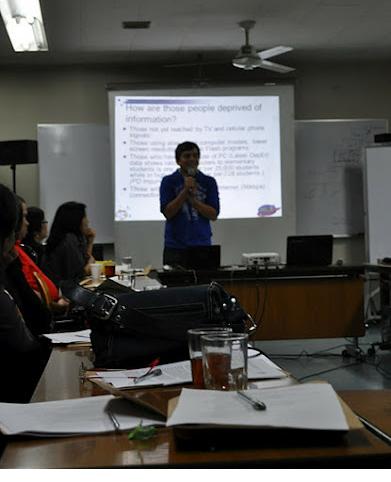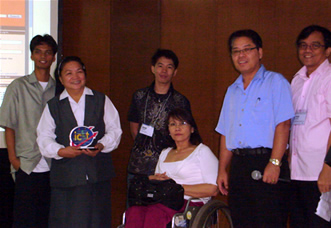
At the Web Accessibility Forum launched by the NCDA SubCommittee on ICT last July 20, 2010, National Computer Center Information Technology Officer Angelita Nicolas announced the issuance of an NCDA-NCC Joint Circular No.1 Series of 2010, enjoining all government instrumentalities concerned, to implement accessible website design using the technical guidelines recommended by the Web Design Accessibility Recommendation (WDAR) Checkpoints of the PWAG.
DOTC Architect Morales represents Sub-Committee on ICT in awarding NCC IT Officer Angelita Nicolas for sharing NCC initiatives on disability and facilitating issuance of NCDA-NCC Joint Circular on Web Accessiblity Compliance
PWAG or the Philippine Web Accessibility Group, is a non-profit advocacy group of Filipino web designers organized by the Council after its web accessibility workshop series from 2004-to 2007. Tasked by NCDA to monitor compliance by participating GO/NGOs through an NCDA Board Resolution, PWAG reported that only 11 GOs complied, compared to triple number in NGOs, which greatly concerns the sector.
To address this low compliance, the SubCommittee on ICT chaired by he Department of Transportation and Communications pooled resources to hold the forum for NCDA member agencies, in time for the NDPR Week. MCCID Training Director and Philippine Web Accessibility Group Current President Jojo Esposa Jr., was one of the main lecturers. He expounded on the Accessible Information and Communications Technology (ICT) and how important it is to everyone especially those who are with physical impairments. He enumerated some access barriers experienced by PWDs when they open government sites. He also introduced a few tips on how to make websites accessible.
For his part, ATRIEV Executive Director Antonio Llanes together with Project Director Rene Orense demonstrated some assistive devices used by visually impaired and those with low vision. These includes screen readers and screen magnifier softwares.
To ensure full compliance in his Department, being a member of the SubCommittee, DOTC Representative Architect Rizal Morales would soon have a similar forum exclusively for all his Department bureaus.
Inspirational messages from NCC Managing Director Juliana Sudario, Philippine DAISY Network President Lauro Purcil, DOTC Architect Rizal Morales and NCDA OIC Matt Lee, Jr. jointly urged the participants to adopt web accessibility to create digital opportunities for all, including PWDs, from the potential offered by ICTs for development.
Third year batch 2010 students of MCCID attended the first Web Accessibility Forum conducted by the National Council on Disability Affairs Sub-committee on Information and Communications Technology held last July 20 at Philvolcs Auditorium in UP Diliman Campus, Quezon City.
Aside from NCDA, other cooperating agencies include the Commission on Information and Communications Technology (CICT) – National Computer Center (NCC), the Department of Transportation and Communications (DOTC) and the Department of Public Works and Highways (DPWH). NCDA member agencies like DOH, DSWD, Philippine Information Agency, DOST and DFA also participated.
The highlight of the forum is the announcement of the official signing of NCC-NCDA Joint Circular No. 1 requiring all websites of government line agencies including their attached, regional and state universities and colleges to redesign their websites in order to pass the web accessibility design standards set by Manila ICT Design Recommendations through the Philippine Web Accessibility Group. NCC IT Officer Angelita Nicolas gave the announcement. She also informed the participants about future workshops and seminars that will be held.
Aside from MCCID, other Persons With Disabilities Non-Government Organizations also attended the forum. These includes ATRIEV, Philippine Network of Daisy Consortium and Philippine Deaf Federation (PFD). PFD President Raquel Estiller-Corpuz requested all government agencies to open their doors to PWDs especially those who don’t have funds to connect to the internet to offer their services free.
The forum’s objective is to make the participants understand the concepts of web accessibility towards a “disability-inclusive” Philippines where information accessibility for persons with disabilities is based on human rights principles. It also aims to encourages the attendees especially the government sector to make their websites compliant to web accessibility standards under the Manila ICT Design Recommendations and/or the Web Content Accessibility Guidelines (WCAG).
The activity coincides with the country’s annual celebration of the 32nd National Disability Prevention and Rehabilitation Week (July 17-23). This year’s theme is “Sa Istrukturang Accessible, Lahat ay Able“. DPWH is this year’s lead agency.
See full text of the Joint Circular here.


















